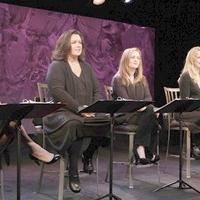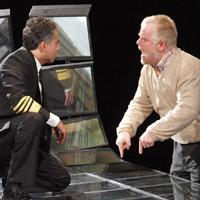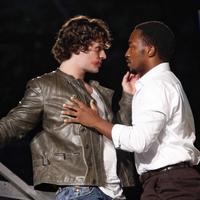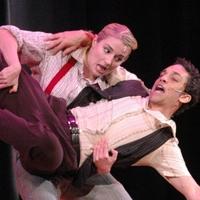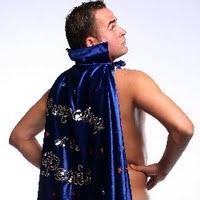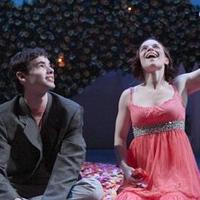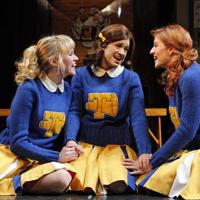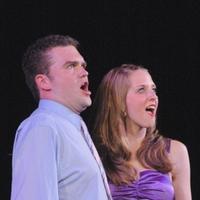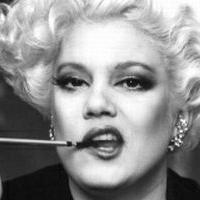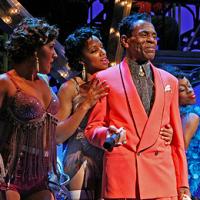Kristin Salaky - Page 7
October 6, 2009
I can't say I've ever really associated important events in my life with what I was wearing. Oh sure, I remember the powder beige tux I wore to my 1977 senior prom (my date picked it out) but since moving to New York I think it's safe to just assume I was wearing black whenever anything significant happened. Not so for the ladies of Love, Loss and What I Wore, a show that my female guest assures me gives an accurate portrayal of how women tend to hold important memories in the stitches of their apparel. And though such sentiments may be foreign to my nature (or perhaps nurture) I found the ninety-minute evening warm, funny (often hilarious), cleverly written and terrifically performed.
October 5, 2009
One of the most interesting chapters in William Goldman's classic book of commercial Broadway, The Season, involves the pre-opening troubles with the musical, Golden Rainbow. (Yes, I'm beginning a review of Little House on the Prairie with an anecdote about a glitzy Steve & Eydie vehicle. Just go along with me on this.) Although the musical had a huge advance sale thanks to the popularity of its husband and wife stars, everyone agreed the book was a disaster. But, according to Goldman, spirits were boosted a bit when rumors started circulating that Neil Simon - who was not only the hottest playwright on Broadway at the time but a guy known for anonymously helping to doctor other shows that were in need of laughs - would be coming in to punch up the script. In the meantime another writer was recruited and told that he didn't have to come up with anything clever; just to write a straightforward, competent book that made sense of the story. Neil Simon would come in later and provide the gags. (P.S. He never did.)
October 2, 2009
There's very little I can recommend from Vigil, Morris Panych's two-person play which I'll assume was meant to be darkly humorous and quirky, but ends up a rather dreary and frequently ugly ninety-five minute affair.
September 28, 2009
In his lengthy notes discussing the thought process behind his LAByrinth Theater Company/Public Theater mounting of Othello, director Peter Sellars explains how our view of Shakespeare's drama of an outsider Moor put into a position of power in an otherwise white society, must change in an era where Barack Obama can become President of the United States. His is an interracial Othello, with Latino John Ortiz (LAByrinth Theater co-founder) as the Moor, white actor (and longtime LAByrinth associate) Philip Seymour Hoffman as the underling Iago who tries to bring him down and an assortment of white, black and Latinos rounding out the company.
September 18, 2009
Some seasons back Peter O'Toole starred in a venture titled Jeffrey Bernard is Unwell, where he portrayed the London journalist whose 'Low Life' column in The Spectator chronicled his alcohol-fueled adventures among the town's Bohemians. When the festivities interfered with his ability to meet a deadline, the title phrase would appear in the space normally occupied by his scribblings. Those in the know... well, they knew.
August 31, 2009
The program notes for Scandalous People: a Sizzling Jazzical, advise us that Myla Churchill (book & lyrics) and Benny Russell's (music) new musical concerns Dewey Demarkov, a fictional black entertainer in pre-Depression Harlem who earned his song and dance chops playing demeaning stereotypes (sometimes in blackface) in white-run vaudeville houses and minstrel shows. As uptown Manhattan developed into a cultural center, Dewey formed an act with his future wife, Desiree Malinda, that evoked the kind of self-respecting class and sophistication the entertainers of the Harlem Renaissance became famous for. His innovative style made his speakeasy shows at The Do Drop Inn a top attraction.
August 26, 2009
I think it's important to report right from the outset that several times during The Public's outdoor production of Euripides' ancient Greek drama, The Bacchae, I looked down to discover that I was involuntarily tapping my toes to Philip Glass' new score. It's not that the master minimalist had peppered the centuries-old text with a collection of Jerry Hermanish showtunes, but that the tandem work of Glass' scoring for synth, brass and percussion and Nicholas Rudall's brisk, modern-sounding translation produced an irresistible give-and-take between speech and tone. No mere incidentals, Glass' airy, elongated pitches, frequently lush and at times strikingly accented, carry equal weight as the spoken words; echoing, answering back, subtextualizing and, most importantly, pushing the production toward its inevitable climax. If the composer's contribution is the 90-minute evening's most memorable, that's not to discredit the rest of director JoAnne Akalaitis' always interesting (if sometimes lacking for passion) production.
August 20, 2009
While calling the recent entertainment at The Triad Erotic Broadway may carry the same lack of appropriateness as expressed in the traditional arguments against the moniker Holy Roman Empire (It's really more 'cute and sexy' than erotic and the material's ties to Broadway are sporadic at best.), the cheery and playful variety show directed and choreographed by Tricia Brouk offers bouncy fun for all (legal) ages.
August 17, 2009
I'll readily admit to letting out a quiet, though not exactly inaudible, 'Wow,' as I entered the main auditorium at 59E59 and took a first glimpse at Kris Stone's New York apartment set for Primary Stages' premiere production of Cusi Cram's A Lifetime Burning. The high-ceilinged collection of sharp angles, backed by exposed brick, colored in blue pastel and embellished by furnishings by Eva Zeisel (I had to look it up), immediately grabbed my interest and had me anxious to meet whomever it was who might be living there.
August 13, 2009
While I certainly wouldn't suggest that Andrea McArdle has been living in the past, that's where she's spent most of her Broadway career; first getting noticed as the Depression-era social climber in Annie, and then nabbing roles in Les Misérables, State Fair and Beauty and The Beast (Hey, 'once upon a time' counts as the past.); not to mention playing young Judy Garland in the TV bio-pic, Rainbow. (Taking a cigarette break along the way to play Ashley in Starlight Express.
August 11, 2009
The star of Town Hall's 3rd Annual All Singin', All Dancin', the traditional finale to the Scott Siegel-created Broadway Summer Festival, didn't take the stage until the end of curtain calls, but his vibrant presence was felt throughout the evening.
August 7, 2009
Let's get one thing straight right from the start. Men do not write monologues about their penises. They don't. Men don't say things like, 'I'm worried about penises,' and they don't require a context of other penises in order to understand this limb that dangles between their legs and jumps up like a puppy whenever it wants to play. We don't think of our genitals as a dark Bermuda Triangle; more like the sleek and powerful jet that's headed its way.
August 6, 2009
I suppose the cocktail conversation among certain factions of the Off-Broadway community this summer will be centered around whether the ending of Lila Rose Kaplan's Wildflower a) thoroughly ruined the play, b) logically brought all the play's diverse pieces together or c) was just another example of the evening's well-intentioned flaws. I lean toward the latter.
August 3, 2009
The 2009-10 Broadway season began with a shirtless man and a bikini-clad woman posed dramatically under a spinning disco ball. Soon after, similarly underdressed performers danced their way up and down the aisles of the Longacre Theatre in displays that suggested over-caffeination more than artistry.
August 2, 2009
A good musical will often send audience members out of the theatre wanting to pick up a copy of the cast album. But the new musical version of Jack Heifner's 1976 Off-Broadway hit, Vanities, might send more than a few attendees to the public library to read a copy of the playscript, or at least hope for a full-on revival of the musical's source.
July 27, 2009
While the title of Town Hall's third annual production of Broadway's Rising Stars suggests a look into the future, I prefer to linger a bit in the present. With a cast consisting of 22 recent grads from such musical theatre savvy institutions as NYU, Carnegie Mellon, AMDA and The Cincinnati Conservatory, all hand picked by creator/writer/host Scott Siegel, his partner in both life and reviewing, Barbara, plus directors Emily Skinner and Scott Coulter, this was a night to treasure the youthful love of the type of songs and the styles of singing that have helped make musical theatre this city's major export to the world.
July 22, 2009
'If they don't know who the hell I am by now,' the evening's star deadpans to the Metropolitan Room staff member who asks if she has any press releases to distribute, 'they can just cut open my neck and count the rings.'
July 18, 2009
You know it's all heading in this direction, don't you? So why delay the inevitable and let's make 2010 the first year where America Votes For The Tony Awards!
July 15, 2009
The marquees of Broadway will once again dim tonight; not to honor a great actor or playwright or director but to commemorate the passing of Harry Edelstein, owner of the theatre district's legendary Café Edison.
July 4, 2009
Have you ever sat in on a production of Moliere's classic comedy Tartuffe and wondered what exactly it was about the religious services of the title character that made the wealthy Orgon want to donate everything he had to his church? Me neither. But apparently playwrights Alfred Preisser and Randy Weiner have and their answer is the Classical Theater of Harlem's crazily entertaining semi-spoof, Archbishop Supreme Tartuffe.
« prev 1 … 4 5 6 7 8 9 10 … 13 next »
Videos


